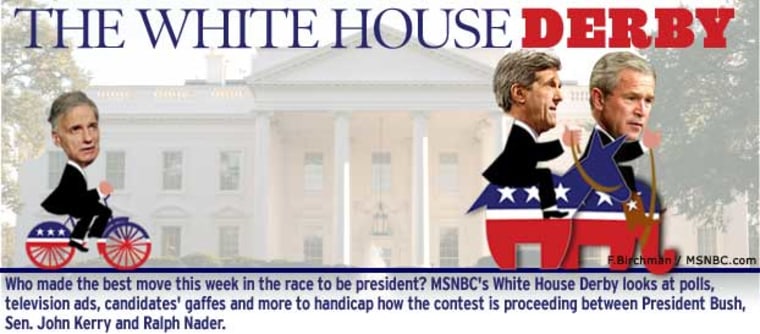Muqtada al-Sadr, the Shiite cleric who is leading a violent resistance to the U.S. occupation authority in Iraq, has a voice, if not a vote, in this November’s election in the United States.
So do Osama bin Laden and al-Qaida leaders, wherever they are, planning the next terrorist attack on the United States or on U.S. forces in Iraq. So do the leaders of Iran and North Korea who have or are seeking nuclear weapons.
More so than in any election since 1972, the outcome this year will be influenced, and perhaps determined, by foreign actors, most of them hostile to the United States.
President Bush’s press conference Tuesday night underscored that point emphatically.
“No one can predict all the hazards that lie ahead or the costs they will bring,” Bush told the nation, referring to Iraq.
Despite his subdued tone, Bush sounded bullish about his own re-election prospects. A reporter asked him whether his commitment to Iraq will have been worth it “even if you lose your job because of it.”
Bush replied, “I don't plan on losing my job. I plan on telling the American people that I've got a plan to win the war on terror. And I believe they'll stay with me. They understand the stakes.”
Do they? And do they see the stakes in the same way Bush does?
Kerry: No distinct difference on Iraq
Most remarkable about Democratic candidate John Kerry’s positioning at this point is that he has not yet offered voters a distinctly different Iraq policy.
Indeed, in his opinion piece in Tuesday’s Washington Post, Kerry offered language that echoed Bush’s own: “The extremists attacking our forces should know they will not succeed in dividing America, or in sapping American resolve, or in forcing the premature withdrawal of U.S. troops. Our country is committed to help the Iraqis build a stable, peaceful and pluralistic society. No matter who is elected president in November, we will persevere in that mission.”
On Wednesday Kerry found himself confronted at City College in New York by a disgruntled anti-Bush voter, retired mathematics professor Walter Daum, who scolded him for not offering a plan to get U.S. troops out of Iraq.
"Is that the criminal course you want to stay?” Daum demanded of Kerry. “It's an imperialist country fighting an imperialist war. At one time you opposed an imperialist war," he said, a reference to Kerry’s opposition to the Vietnam War.
While Daum seemed to be betting on a Kerry victory in November, he forecast an unhappy presidency for him. "People hate George Bush,” Daum said. “But by the end of your presidency, people will hate you for the same thing."
How big is the “Daum vote” — people who are angry about Iraq and may not vote for Kerry unless he proposes something closer to a Dennis Kucinich plan to withdraw U.S. soldiers from Iraq? That question may prove decisive in November.
Cautiously treading water
For the moment Kerry appears to be cautiously treading water. Perhaps his focus is on his vice presidential choice.
Or perhaps Kerry calculates that Iraq is now becoming such a quagmire for Bush that Kerry need do little more than stand by, watching Bush’s re-election hopes sink down, down, down into the bog.
The Kerry team keeps pushing on other, non-Iraq fronts (a new "misery index," help for middle-class families to pay for college, a new push for national service by younger people).
Some Democrats outside the Kerry team wonder why Bush isn’t further behind in polls, given that the images televised from Iraq have been so grim in recent weeks. Bush himself acknowledged that grimness in his news conference: “Look, nobody likes to see dead people on their television screens — I don't. It's a tough time for the American people to see that.”
Bush is holding his own in the polls. Indeed in one poll this week in New Jersey (15 electoral votes), Bush beat Kerry, 48 percent to 44 percent, with Ralph Nader getting 5 percent.
In the highly unlikely event that Bush ended up winning New Jersey, he’d carry 45 other states as well. (Al Gore carried New Jersey by more than half a million votes in 2000.)
Kerry is campaigning Friday in Pittsburgh. It would be almost impossible for Kerry to win the presidency without carrying Pennsylvania’s 21 electoral votes.
Bush campaigned this week in Iowa (seven electoral votes), a state he lost by a mere three-tenths of 1 percent in 2000.
